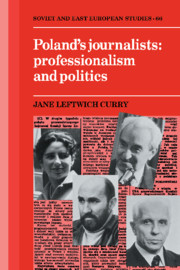Book contents
- Frontmatter
- Contents
- Acknowledgments
- 1 Journalists as professionals in theory and reality
- 2 The postwar roots of the profession
- 3 Living and learning journalism
- 4 Professional associations and professional politics
- 5 Journalists as political actors
- 6 Solidarity and beyond: the critical test of professionals and professionality
- Appendix: Research methodology: unwritten answers
- Notes
- Select bibliography
- Index
- Soviet and East European Studies
Appendix: Research methodology: unwritten answers
Published online by Cambridge University Press: 30 September 2009
- Frontmatter
- Contents
- Acknowledgments
- 1 Journalists as professionals in theory and reality
- 2 The postwar roots of the profession
- 3 Living and learning journalism
- 4 Professional associations and professional politics
- 5 Journalists as political actors
- 6 Solidarity and beyond: the critical test of professionals and professionality
- Appendix: Research methodology: unwritten answers
- Notes
- Select bibliography
- Index
- Soviet and East European Studies
Summary
This research is intended to present the story of Polish journalism. It is a story that, in spite of journalists' control of the press, does not appear in that press. Journalists, as a matter of professional pride, have not “hung their dirty linen in public” and, furthermore, like the word “censorship” in the seventies, much of what they had to say about themselves could not have been published. In this, they are not unique as a profession. Furthermore, like other professionals' they have never been involved in continually reflecting on what and why they are acting.
To tell this story then, I could rely only in part on the published materials that were available in the Polish press and the professional press that journalists published – even in the Solidarity period when there was a sudden flood of discussion of long taboo subjects. And, even with the access I was able to have to internal documents of press research institutes, the SDP and SDPRL, and various groups and individuals, these documents alone could never have made the story complete. So, I used research techniques that had long been assumed to be impossible to use to any major degree in the Soviet bloc: the interview and survey research. In asking questions of my subjects, however, I was able to deal with issues of professionalization and of professional activity and attitudes in ways that would not have been conceivable at all with only written documentation.
- Type
- Chapter
- Information
- Poland's JournalistsProfessionalism and Politics, pp. 243 - 246Publisher: Cambridge University PressPrint publication year: 1990

